Part 5 of our wilderness journey
Simplicity in all things is the secret of the wilderness
and one of its most valuable lessons.
It is what we leave behind that is important.
I think the matter of simplicity goes further than
just food, equipment, and unnecessary gadgets;
it goes into the matter of thoughts and objectives as well.
When in the wilds,
we must not carry our problems with us
or the joy is lost.
~Sigurd Olson: Wilderness Quotes
Over the last few weeks, I’ve written a handful of blogs about my recent trip to South Africa and Botswana to visit WILD’s partners and programs to experience Africa’s unique and primal wild-nature. The past few days, Vance and I have written specifically about our experience on trail in the Umfolozi Game Reserve with our sister organization, The Wilderness Leadership School. This will be the last post about our journey, and I think it is suitable to dedicate it to “The Inner Journey.”
Mostly, we’ve written about the material and physical aspects of our trail – The Trail, The Wildlife, The Camp and The Food. More or less, these aspects remain the same each time we spend time in nature. The scenery changes, but we still camp, walk, eat and see other creatures that share the space with us. What changes most is who we are personally and who we are with collectively — how those two components interact, react and respond to the physical aspects of the journey.
The Wilderness Leadership School intentionally builds reflective space and group process into every trail so that the inner journey and the inter-personal journey has space. Each day – or more often, depending on the events of the day – the trail group gathers for ‘indaba.’ Indaba is a traditional practice of the Zulu people, the indigenous tribe to the province of KwaZulu-Natal in South Africa. It is a gathering or meeting to discuss important issues or areas of concern.
On trail, we use the indaba to discuss what we are experiencing personally and collectively. During indaba, only one person speaks at a time and everyone is invited to speak about how they are feeling and what they are experiencing. It is a very important time for sharing and a powerful group experience, and it can be a rather emotional gathering.
Each day also has many opportunities for quiet, individual reflection. The Wilderness Leadership trails are not ‘adventure’ trails. While there is plenty of adventure and adrenaline, each day you walk only 5-7k (3-4 miles). You stop frequently, to observe your surroundings and each afternoon there is time set aside for reflection and down time. There is no rappelling, white water kayaking or high-ropes style activities. Your primarily challenge is to live simply and quietly, which was a pretty big challenge for me. I like to move fast, be active and sometimes live a bit to loudly.
One of the more memorable parts of our trail – and every trail with the School – is night watch. Each night, individuals take turns watching over camp – listening for animals, watching for eyes in the night. Our guides sleep — they usually need it after a long day — and are only woken up if something appears dangerous. You keep the fire burning, tell time by the stars, maybe sip some tea. The night can be quiet or loud with wild-noises…but regardless, it is a peaceful time for reflection.
Honestly, night watch scared me. I was on hyper-alert. But, I survived and only woke up our guides once (because part of a tree fell down and it was LOUD and SCARY). Admitting to being scared is not something that comes naturally for me….so perhaps that’s the lesson I learned on trail.
I went to the woods because I wanted to live deliberately
to front only the essential facts of life
and see if I could not learn what it had to teach
and not, when I came to die,
discover that I had not lived.
~Henry David Thoreau
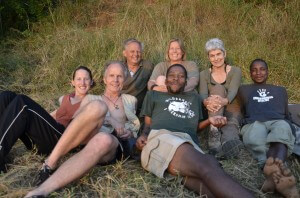 Notes: Our recent wilderness trail experience (30 April – 4 May 2011) included Vance Martin, WILD’s President, Emily Loose, WILD’s Director of Communications, Charlotte Baron, Chair of WILD’s Board of Directors, Magnus and Bettina Sylven, our friends and colleagues from Switzerland and our guides: Mandla and Simphiwe.
Notes: Our recent wilderness trail experience (30 April – 4 May 2011) included Vance Martin, WILD’s President, Emily Loose, WILD’s Director of Communications, Charlotte Baron, Chair of WILD’s Board of Directors, Magnus and Bettina Sylven, our friends and colleagues from Switzerland and our guides: Mandla and Simphiwe.
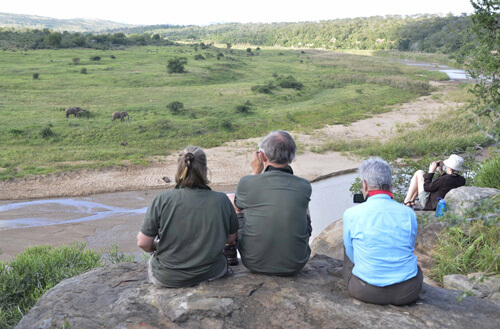
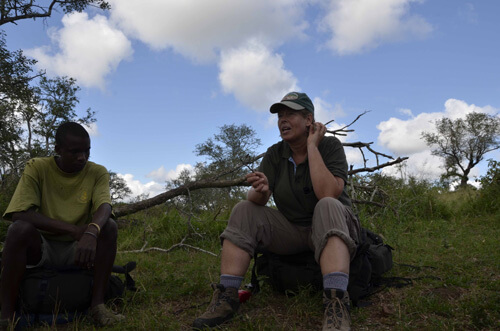
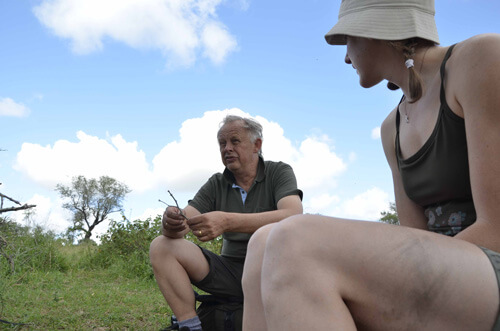
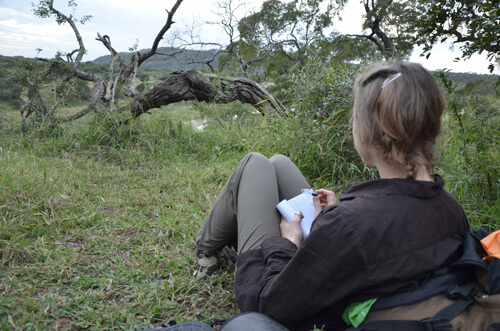
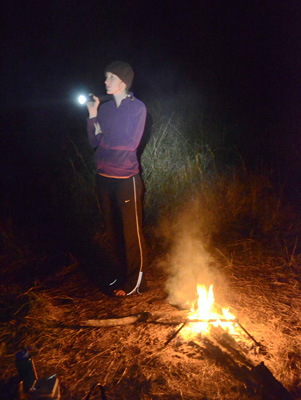


Destroy the Wilderness and grass will grow on our city pavements (Frank Frazer Darling PELICAN IN THE WILDERNESS).
NATURE NEEDS HALF